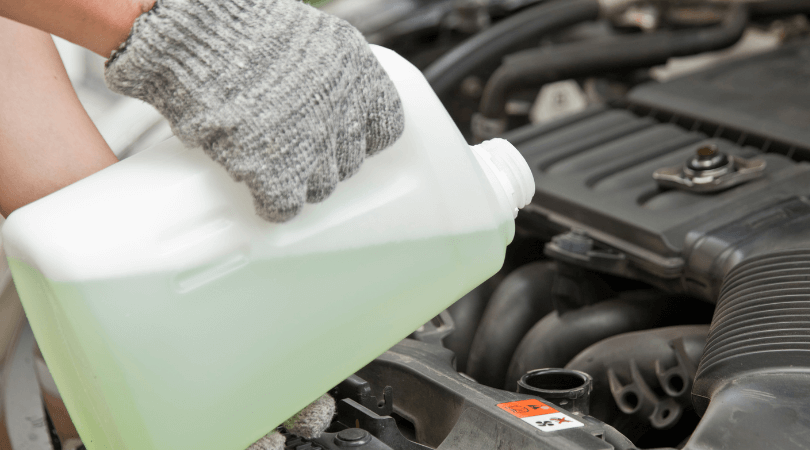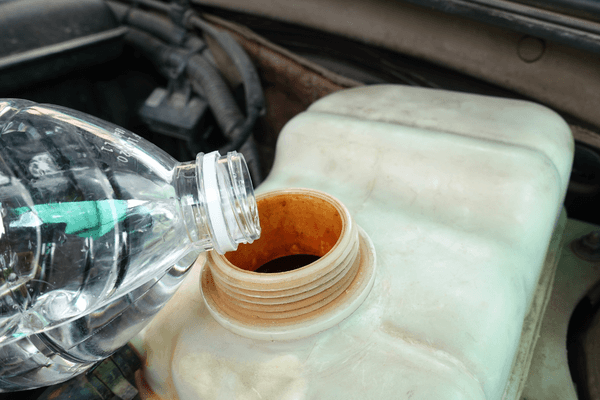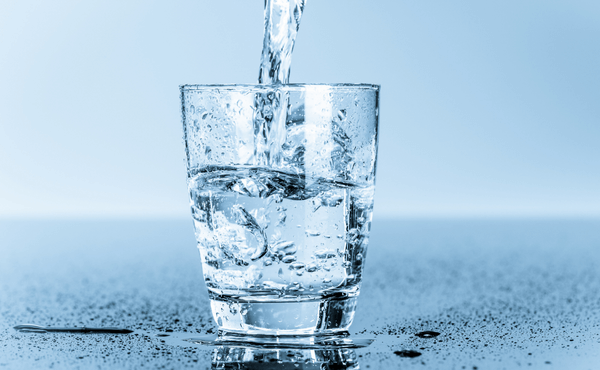Quick Navigation
Can You Use Water as Coolant
Most people know the importance of having an effective cooling system to keep engines running at peak performance. But many do not know that water, rather than a commercially available coolant, can also be used as a cooling agent.
While certain risks and limitations are associated with using water in this way, it can be an incredibly cost-effective solution for those looking to save money on engine maintenance and repairs. In this post, we will explore the pros and cons of using water as a coolant and how you can make sure it is done safely and correctly.
Utilizing water instead of coolant in your vehicle can only offer a temporary solution and does not adequately protect the engine. Investigating and rectifying the root cause of a diminished coolant level is vital, as replenishing the radiator with a balanced blend of 50% coolant and 50% water.
What is Coolant?
The answer is yes and no if you use water as engine coolant. Water is an excellent heat conductor and does a great job moving heat away from engine parts. However, it also rusts metal and degrades rubber seals.
To help offset these adverse effects, water is usually mixed with anti-freeze (a glycol solution), which helps protect against corrosion and freezing. The antifreeze also raises the boiling point of the water, allowing the coolant to do its job even at high temperatures.
The Different Types of Coolants
There are many different types of coolant, but the most common is antifreeze. Ethylene glycol or propylene glycol is added to water to create antifreeze. It keeps and prevents the engine from overheating in hot weather and freezing in cold weather.
Water can cool things down; however, it will not protect your engine from freezing or overheating. That is why most cars have a mix of water and antifreeze in their radiator.
Can You Use Water For Coolant
Yes, water can be used as a coolant. However, there are a few things to remember. Water is an excellent conductor of heat, so it can help to dissipate heat quickly.
However, water also has a relatively low boiling point, so it can reach its boiling point faster than other coolants.
This means that water needs to be monitored closely and frequently replenished to prevent it from overheating.
Additionally, water can rust and corrode metal surfaces, so it is essential to use a corrosion-resistant coolant if using water as coolant.
The Benefits of Using Water as A Coolant
Water is an exceptional coolant in numerous applications due to its cost-effectiveness, non-toxicity, and significant specific heat capacity.
Furthermore, its efficient heat conduction ability ensures the safe transfer of heat from sensitive components. One of the compelling merits of opting for water as a coolant is its affordability.
Compared with other fluids, such as antifreeze or engine oil, water is a substantially more economical alternative. This attribute makes it a desirable choice for those mindful of their budget.
In addition to this, the non-toxic nature of water makes it a safe option for applications where it might interact with food or potable water.
One of the distinguishing attributes of water as a coolant is its high specific heat capacity.
This characteristic allows water to absorb a considerable amount of heat before experiencing a temperature rise, making it particularly effective in high-temperature environments or applications requiring efficient cooling.
Moreover, water’s proficient heat conduction capability ensures a swift and effective heat transfer from delicate components. This property aids in the longevity of these components by safeguarding them from potential overheating and consequential damage.
Interesting Read – How To Start Cars Without Keys | Issue 100% Fixed
The Drawbacks of Using Water as A Coolant?
One of the most significant drawbacks of using water as coolant is that it can corrode metal surfaces. This is especially true if the water is not filtered correctly and contains high levels of minerals.
Water can also cause electrical shorts and leaks if it comes into contact with sensitive components.
Another downside to using water as a coolant is that it can evaporate quickly, so it needs to be refilled more often than other types of coolants.
Finally, water can freeze in cold temperatures, damaging your vehicle’s engine.
Other Options For Coolant
While water may be the most cost-effective and readily available option for coolant, it may not be the best choice for your vehicle.
Water can cause corrosion and scale build-up in your engine, leading to costly repairs. If you live in a cold climate, water can freeze in your engine, causing severe damage.
There are several other options for coolant that may be better suited for your vehicle.
Ethylene glycol coolant is one option that will not corrode your engine or freeze in cold weather.
Propylene glycol coolant is another less toxic option than ethylene glycol and has a lower risk of causing allergic reactions.
Can I Put Water In My Radiator?
You might consider adding water to the radiator if your vehicle’s coolant level runs low. However, this approach isn’t recommended as it can lead to your engine overheating.
Water and coolant exhibit distinct characteristics. While the coolant is formulated to absorb heat, water is a heat conductor. Consequently, supplementing your radiator with water could cause your engine to operate at higher temperatures.
Furthermore, water possesses the potential to instigate rust and corrosion in your engine parts, inflicting serious damage over time.
If you find yourself in an urgent situation and must top up your vehicle’s coolant, it’s advised to utilize only distilled water or a coolant engineered explicitly for cars.
How Does Coolant Work in the Cooling System?
Water is the most common type of coolant used in vehicles. It is mixed with a water-based solution, usually antifreeze, which helps to keep it from freezing in cold weather and overheating in hot weather. The mixture of water and antifreeze also helps to protect the engine from corrosion.
The coolant flows through the engine and absorbs heat, then flows through the radiator, where it loses the heat before recirculating back through the engine again.
Can I Use Regular Water Instead of Engine Coolant in My Car?
If your car is low on coolant, you may be tempted to add water to the radiator. However, this is not a good idea and can cause more problems than it solves.
Water does not have the same properties as coolant and will not protect your engine similarly. Coolant is specifically designed to transfer heat away from the engine and prevent it from overheating. Water will not do this as effectively and could lead to your engine overheating.
However, as I mentioned earlier, if you’re short on coolant, water is a fantastic substitute, but only temporarily.
In addition, water can cause corrosion and rust inside the engine, leading to serious road problems. It is best to stick with using coolant in your car’s radiator.
Fascinating Read – Car Jerk When Accelerating | Completely Fixed!
Why is Coolant Important?
Coolant is important because it helps keep your car from overheating. Water can’t do this as well as coolant can because water boils at a lower temperature than coolant.
This means that when water gets too hot, it turns into steam and doesn’t work as well at cooling your engine. Coolant also does not freeze as easily as water, so it can help your car start in cold weather.
What to Consider When Using Water as a Coolant?
Consider a few things to consider whether you are using water as a coolant in your car or home.
The first is the temperature of the water. If the water is too cold, it can cause engine damage. Conversely, if the water is too hot, it can cause problems with your cooling system. Finding a happy medium when using water as a coolant is essential.
Another thing to consider is the quality of the water. If the water is not clean, it can clog your cooling system and cause problems. Be sure to use clean, filtered water as a coolant.
Finally, it would be best to consider how often you will use the water as a coolant. If you only use it occasionally, you may not need to worry about changing it as constantly.
However, if you use it frequently, you will want to change it more often to prevent buildup and ensure optimal performance.
How to Use Water As a Coolant?
If your car has an overheating problem, you may be able to use water as a coolant. Here is how:
[su_table responsive=”yes” fixed=”yes”]
| Step 1 |
Safely park your car and switch off the engine. Wait for a minimum of 30 minutes to let the car cool down.
|
| Step 2 |
Lift the hood and find the radiator cap. Gently take off the cap and fill the radiator with water until it reaches the top.
|
| Step 3 |
Put the radiator cap back on and start the engine. Let the engine idle for a few minutes, then activate the heater to aid in circulating the coolant.
|
| Step 4 |
If the car continues to overheat, seek professional help from a mechanic for further examination.
|
[/su_table]
Which Type of Water Should You Use for Cooling?
There are a few different types of water that can be used for cooling, but the best type is distilled water. This type of water has removed all of the impurities and minerals so that it won’t cause any damage to your cooling system.
Additionally, distilled water will help extend your cooling system’s life by preventing corrosion and build-up.
Why You Should Change Your Coolant?
As your car’s engine heats up, the coolant absorbs the heat and transfers it away from the engine. That is why it’s essential to keep your coolant level topped up and to change it at the recommended interval.
But what if you run out of coolant and need to top up? Can you use water as a temporary measure?
Water can be used temporarily, but it’s not ideal. Water has a lower boiling point than coolant and will therefore evaporate more quickly. This means it won’t be able to transfer heat away from the engine as effectively. It can also rust metal parts, which is not a coolant issue.
So if you need to top up your coolant, use the correct fluid. You can buy pre-mixed coolant or mix using distilled water and antifreeze.
Water as a Coolant Temperature Test
FAQs
Below are the frequently asked questions for can you use water for coolant. Let’s dig deep to know more about water coolant.
Do You Have to Use Distilled Water for Radiator?
If your radiator is made of aluminum, using distilled water is essential to prevent corrosion. If your radiator is brass or copper, you can use either distilled water or a 50/50 mix of distilled water and antifreeze.
Are Coolant and Antifreeze the Same?
Most people think that coolant and antifreeze are the same but different. Coolant is a liquid that helps to keep your engine cool, while antifreeze is a chemical that prevents your engine from freezing. You can use water as a coolant, but it will not protect your engine from freezing.
How to Check Your Radiator Fluids?
To check your radiator fluids, you must locate and unscrew the radiator cap. Once the radiator cap is off, you can see the coolant level. If the coolant level is low, you will need to add more fluid. Using the correct fluid type is essential, as using water as a coolant can cause damage to your engine.
How to Safely Dispose of Coolant?
To safely dispose of coolant, you must contact your local waste management company to find out the best way to do so in your area. You may be able to pour it down the drain simply, but this isn’t always the case.
Ensure you follow all instructions from your waste management company to dispose of the coolant properly.
Will a Car Overheat with Just Water?
If your car overheats with just water, it means that there is a problem with the water pump or thermostat. If the water pump is not circulating the coolant properly, it will cause the engine to overheat.
The thermostat may be stuck in the closed position, which will not allow coolant to flow through the engine and will cause it to overheat.
How Far Can I Drive with Water in My Radiator?
If your car has overheated and you do not have any coolant, you can use water as a temporary fix. However, it’s important to remember that water will evaporate quickly and doesn’t protect against corrosion as coolant does.
So, it is best only to use water as a last resort and to get your car to a mechanic as soon as possible.
Is It Better to Use Coolant or Water?
Coolant is a mixture of water and chemicals designed to keep your engine at the correct temperature and prevent corrosion. Water is just…well, water. It will evaporate quickly, especially in hot weather, and it will not do anything to protect your engine from rust or overheating.
So, if you will use something other than coolant in your radiator, stick with good old H2O. But last, coolant is better than any other substance, whether it is water also.
Conclusion
That was my take on can you use water as coolant.
In conclusion, water as a coolant can be used in certain applications. When mixed with an antifreeze solution and the correct internal specifications are followed, it is possible to achieve beneficial cooling properties.
However, several drawbacks are associated with using water as a coolant, such as increased corrosion and freezing temperatures.
Ultimately, deciding whether or not to use water as your vehicle is coolant should ultimately come down to you reviewing all the available options and choosing which one best fits your needs.



